Publishers have responded to calls for change and many now offer a range of publishing options and support services, including fully open access or ‘hybrid’ journals and platforms. But what more still needs to be actioned?
Now in its fourth year, our Time for Change survey overall explores the challenges within academic culture and gauges interest for change from across the globe.
Take a look at the main findings from the survey relating to changing publishing formats and the role of the publisher and the key factors that are holding back or driving societal change.
On this page
Top findings
This global survey was conducted during July–August 2022, and in total received 1,427 responses from academics worldwide. The survey was open between 6 and 25 July 2022, and was sent to 204,967 contacts giving a 0.7% response rate

OA lacks a level playing field
The open access challenges remain around limited access to funding, with an increase in researchers feeling funding is to STEM centric compared to the social sciences (24% vs 17%). A third say it’s not a level playing field for those in low/medium income countries. Still high numbers at 39% (but lower than 2020) who say their institution prefers them to publish in traditional outlets with established metrics such as Impact Factors. This is most pronounced In Australia & N America.

Sensitivities of open datasets & preprints
Sensitivities around personal information (49%), open datasets and security issues over the reuse of data (41%) remain some of the biggest challenges for Open Research. Over a third say it is not yet widely accepted yet by all subject disciplines/academic institutions or they are put off by there being no rewards for making data open. 38% of academics saying there needs to be some form of quality assessment.

Funding bias & lack of collaboration opportunities
Academics believe the main problem with the way research is done today is funding only being given to more established researchers (55%), and 51% say research is trying to fit the funding opportunities. Poor opportunities for collaboration with practice is the third biggest challenge at 41%.

Publishers should do more for the underfunded
Publishers have to play their part with 70% believing they should be doing more to support research in underfunded areas. 62% would like publishers to offer different options to publish and over a half want more post publication support.

Equity builds trust
When asked about what actions should publishers take to improve trust between authors and publishers the top answers were fair and balanced feedback on research submissions (64%), treating researchers in different parts of the world the same (62%) and being transparent in peer review (62%)
Questions

Q1. What, in your opinion, are the challenges to publishing open data? (Please select all that apply.)










|
Area, % chosen |
Limited access to funding for the cost of open publishing |
My institution prefers me to publish in traditional outlets with established metrics such as the Impact Factor |
Lack of a level playing field for those in low- or medium-income countries (LMICs) |
It is not yet widely accepted by all subject disciplines/academic institutions |
Resistance of publishers to move away from paywalls |
|---|---|---|---|---|---|
|
Overall 2022 |
76.2% |
38.7% |
32.9% |
27.5% |
27.3% |
|
Overall 2021 |
74% |
44% |
25% |
29% |
30% |
|
Overall 2020 |
74% |
48% |
- |
30% |
30% |
|
Area, % chosen |
Policies and funding too STEM-centric compared with social sciences |
Not enough publishing platforms allow me to do this at the moment |
Confusion over open access mandates like Plan S |
I want to publish open access, but I'm confused how I go about it |
There are no challenges to publishing open access |
|---|---|---|---|---|---|
|
Overall 2022 |
24.0% |
21.2% |
20.5% |
14.7% |
1.6% |
|
Overall 2021 |
24% |
19% |
20% |
14% |
6% |
|
Overall 2020 |
17% |
17% |
16% |
14% |
6% |

Q2. What, in your opinion, are the challenges to publishing open data? (Please select all that apply.)

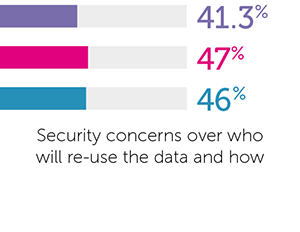







Descriptions of the methods were provided to respondents.
|
Area, % chosen |
Some datasets contain sensitive or personal information which is inappropriate or unethical to share openly |
Security concerns over who will re-use the data and how |
It is not yet widely accepted yet by all subject disciplines/academic institutions |
I am not rewarded for making my data open |
|---|---|---|---|---|
|
Overall 2022 |
48.7% |
41.3% |
34.3% |
34.3% |
|
Overall 2021 |
53% |
47% |
38% |
32% |
|
Overall 2020 |
50% |
46% |
37% |
31% |
|
Area, % chosen |
Datasets will have to stand-up to external scrutiny |
Not enough publishing platforms allow me to do this at the moment |
Open data will discourage participants from taking part in research projects |
I don't know how to share my data |
There are no challenges to publishing open data |
|---|---|---|---|---|---|
|
Overall 2022 |
24.7% |
23.4% |
22.2% |
9.7% |
4.7% |
|
Overall 2021 |
26% |
21% |
26% |
9% |
9% |
|
Overall 2020 |
20% |
18% |
27% |
7% |
8% |

Q3. Which of the following peer review methods are the most effective, either as an author or as a reviewer? (Please select all that apply.)



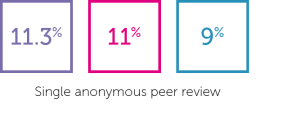

|
Area, % chosen |
Double anonymous peer review |
Transparent peer review |
Open peer review |
Single anonymous peer review |
Post-publication peer review |
|---|---|---|---|---|---|
|
Overall 2022 |
80.8% |
21.5% |
19.8% |
11.3% |
8.5% |
|
Overall 2021 |
81% |
21% |
15% |
11% |
9% |
|
Overall 2020 |
82% |
21% |
16% |
9% |
9% |
How can the peer review process be improved to make it fairer and more inclusive?
"Associated editors must have access to databases of potential reviewers to make proper selections. The editorial board must have specific, strict ethical rules, to prevent personal biases from reviewers." Man academic in Spain
"At least persuade high impact journal to have a quota for high quality studies from low-income economies." Man Academic in Zimbabwe
"Create incentives for peer review. According to Carroll, formal training on how to conduct peer reviews could help improve the quality and pace of reviews. ... Conduct fully blinded reviews. ... Publish manuscripts for public review. ... Change attitude." Man academic in Poland
"Identity of the writer should not be known to the reviewer - it can prejudice the review." Demographic not supplied

Q4. What is your opinion of pre-prints? (Please select all that apply.)




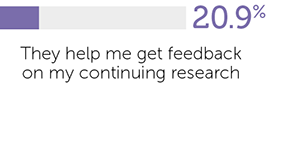
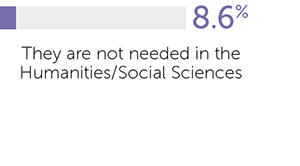

Note: no explanation of pre-prints was provided to respondents.
|
Area, % chosen |
There needs to be some quality assessment |
Pre-prints are useful to get research out quickly |
Pre-prints can be dangerous as non-peer reviewed research is then published in the public domain for all to use. |
Pre-prints add to the noise of research and aren’t helpful |
They help me get feedback on my continuing research |
They are not needed in the Humanities/Social Sciences |
I am not familiar with pre-prints |
|---|---|---|---|---|---|---|---|
|
Overall 2022 |
38.2% |
33.2% |
28.9% |
21.4% |
20.9% |
8.6% |
13.3% |

Q5. What, in your opinion, are the problems with the way research is done today? (Please select all that apply.)
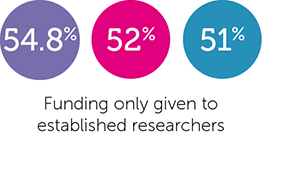






|
Area, % of times chosen |
Funding only given to established researchers |
Too much focus on research by stealth (trying to fit the research into funding opportunities) |
Poor opportunities for collaboration with practice |
The academic culture doesn’t encourage opportunities to challenge ideas |
|---|---|---|---|---|
|
Overall 2022 |
54.8% |
51.2% |
40.7% |
40.0% |
|
Overall 2021 |
52% |
49% |
37% |
43% |
|
Overall 2020 |
51% |
50% |
37% |
45% |
|
Area, % of times chosen |
Not enough time/space given to failure |
Poor opportunities for collaboration with different disciplines |
Incentives to publish don’t focus on the quality of research |
There are no problems with the way research is done today |
|---|---|---|---|---|
|
Overall 2022 |
40.3% |
37.1% |
35.6% |
1.7% |
|
Overall 2021 |
43% |
36% |
37% |
- |
|
Overall 2020 |
42% |
35% |
37% |
- |

Q6 - On a scale of 1 to 5 where 1 is Strongly disagree and 5 is Strongly agree, how much do you agree with these statements based on personal experience?







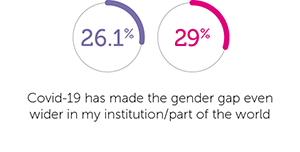

Percentage relates to those who agreed or strongly agreed.
|
Area, percentage agreed or strongly agreed |
Publishers should be doing more to support research in under-funded areas | Time spent on preparing for and delivering online or hybrid teaching means less time for research | Those in low- or medium-income countries (LMICs) are unfairly disadvantaged by citation-based systems | Under funded research areas are severely affected in a post Covid-19 world |
|---|---|---|---|---|
| Overall 2022 | 69.7% | 62.6% | 58.2% | 53.1% |
| Overall 2021 | 64% | 66% | 60% | 52% |
|
Area, percentage agreed or strongly agreed |
Opportunities to travel and collaborate in a post Covid-19 world have severely impacted on my research | Citation based system unfairly disadvantage my institution/part of the world in getting quality research out there | The digital divide is a major issue for me and has widened during the pandemic | Covid-19 has made the gender gap even wider in my institution/part of the world | Open access publishing is not a viable option for my discipline |
|---|---|---|---|---|---|
| Overall 2022 | 51.6% | 43.1% | 36.1% | 26.1% | 25.0% |
| Overall 2021 | 53% | 40% | 35% | 29% | 23% |

Q7. What, in your opinion, could publishers do to help improve academic culture? (Please select all that apply.)
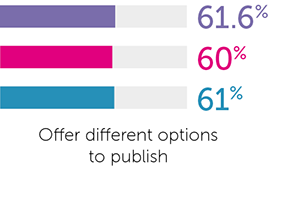






| Area, % chosen | Offer different options to publish | Provide more support for post-publication promotion | Ensure greater diversity of editorial boards | Publish more exploratory research | Champion alternative methods of impact | Help to incorporate impact at the start of research | I don’t think publishers can play a role in improving academic culture |
|---|---|---|---|---|---|---|---|
| Overall 2022 | 61.6% | 51.5% | 46.4% | 46.1% | 42.1% | 23.0% | 1.6% |
| Overall 2021 | 60% | 48% | 39% | 48% | 44% | 23% | 9% |
| Overall 2020 | 61% | 45% | - | 43% | 46% | - | 8% |
"“Treat authors and reviewers in LMICs differently: provide greater support and opportunities to engage in development." Woman academic in Australia

Q8. Which of the following actions do you think academic publishers need to take to improve trust between author and publisher? Please use the other option to describe any other actions that are important.


|
Area, % chosen |
Give fair and balanced feedback on my research paper |
Treat researchers in different parts of the world the same |
Be transparent / thorough in peer reviews |
Have diverse editorial boards |
Make my research openly available |
Offer a choice of publishing routes | Be fair and equitable in their publishing practices |
|---|---|---|---|---|---|---|---|
|
Overall 2022 |
63.4% |
61.8% |
61.6% |
61.6% |
61.2% |
60.4% | 59.9% |
|
Area, % chosen |
Be transparent over costs and charges | Present my research in an impactful way | Offer a reliable / consistent publishing experience | Offer a high-quality publishing experience | Correct their mistakes | Respond to my queries | Be empathetic in their dealings with me |
|---|---|---|---|---|---|---|---|
|
Overall 2022 |
58.2% | 56.6% | 55.5% | 54.7% | 52.0% | 47.5% | 45.2% |
Does academia really want change, please tell us your thoughts: Please also use the space below if there is anything else you would like to comment about?
"Academia changes VERY slowly. The world around us, however, has had seismic changes and the academia is very slow to respond. I have a well-established career, but I worry about those newer to the profession and what their future will look like." Woman academic in US
"Academia declares the need for change but makes it very slowly and this while economic cycles have shortened. The Academy does not start with needs, but further promotes something new, which may not be of interest to any of the practitioners." Man Academic in Ukraine
"Academia is in dire need of change. Institutions and how they measure your performance and promotion are very tightly tied to impact factor and citations. This forces us to do research that will achieve these incentives rather than doing research that is interesting and necessary that is published in a more accessible format." Woman academic in South Africa
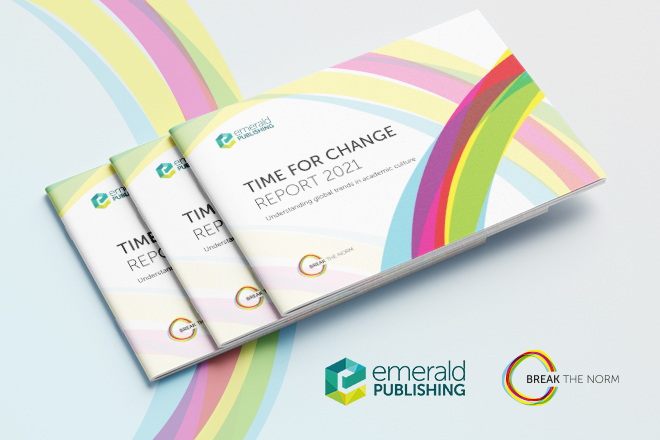
2021 academic culture survey
Our third academic culture survey gathered views on change between July–August 2021. You can read the full Time for change 2021 report, here.

Are you in?
For championing alternatives to traditional academic metrics and rewards? Let’s work together to help the sector break ties with old measures of impact and enjoy a fairer, more equitable environment for research to thrive.

